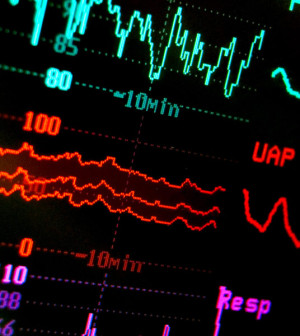- Could Your Grocery Store Meat Be Causing Recurring UTIs?
- Are You Making This Expensive Thermostat Error This Winter?
- Recognizing the Signs of Hypothyroidism
- 10 Strategies to Overcome Insomnia
- Could Artificial Sweeteners Be Aging the Brain Faster?
- Techniques for Soothing Your Nervous System
- Does the Water in Your House Smell Funny? Here’s Why
- Can a Daily Dose of Apple Cider Vinegar Actually Aid Weight Loss?
- 6 Health Beverages That Can Actually Spike Your Blood Sugar
- Treatment Options for Social Anxiety Disorder
Genes May Be Tied to Cardiac Arrest Risk in Dialysis Patients


Genes may play a role in cardiac arrest risk among kidney patients who are on dialysis, new research suggests.
In a study of pairs of kidney patients who were on dialysis, the risk of cardiac arrest was 70 percent higher in the pairs where the two patients were blood relatives.
In general, patients on dialysis are 20 times more likely to suffer cardiac arrest than people in the general population, and cardiac arrest is the leading cause of death among patients on dialysis, the researchers noted.
The finding suggests that genes may play a role in cardiac arrest risk among these patients, and that pinpointing these genes may lead to new treatments to lower the risk, the researchers added.
The study was published online April 16 in the Journal of the American Society of Nephrology.
“These findings advance the science because they suggest that genetic factors — or differences in DNA sequence — contribute to the high risk of sudden death among patients on dialysis,” study author Dr. Kevin Chan, from Massachusetts General Hospital in Boston, said in a journal news release.
“It paves the way for more detailed genetic studies in the dialysis population to find specific genes that could explain the high risk of cardiac arrest and potentially new treatments for these patients,” he added.
The researchers analyzed data from nearly 650,000 dialysis patients, focusing on about 5,100 pairs of patients from the same family. Each patient was then matched to an unrelated control patient. Cardiac arrest was the cause of death in both patients in 4.3 percent of the family pairs, compared with 2.6 percent of unrelated pairs of patients.
Compared with unrelated pairs, the risk of dual cardiac arrest was 88 percent higher among genetically related family members who did not live together, and 66 percent higher among genetically related family members who did live together.
Dialysis patients who were spouses were not at increased risk for cardiac arrest.
More information
The National Kidney Foundation has more about dialysis.
Source: HealthDay
Copyright © 2026 HealthDay. All rights reserved.










